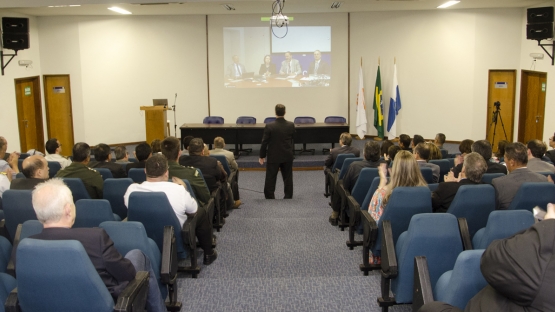The Opening Ceremony of the First School of Emergency Management in Latin America and the Caribbean took place on 9 November 2015 in Rio de Janeiro, Brazil at the Institute of Radioprotection and Dosimetry (IRD) of the National Nuclear Energy Commission (CNEN) of Brazil. The opening ceremony attracted high ranking representatives from all the organizations collaborating to make this School a reality. The event counted with the presence of Isaac Obadia, Director General for Research and Development of CNEN; Thierry Dudermel Head of Development and Cooperation - EU Delegation in Brazil Luis Longoria, Director of Technical Cooperation to Latin America and the Caribbean; Elena Buglova, Head of the Incident and Emergency Centre (IEC) and Dejanira Lauria, Director of IRD.
This school was developed with the support of the IAEA technical cooperation programme, and with funding from the European Commission. In his address to the participants, Mr. Thierry Dudermel, EU Delegation in Brazil, explained that for 25 years the EU has supported nuclear security all over the world.. Since 2007, the EU has been working closely with the IAEA to implement several cooperation projects. This school is a result of the EU's cooperation with the IAEA, and we are proud to be associated with the IAEA in the development of this course.
During the opening ceremony, Luis Longoria, Director of the Division of Latin America in the Department of Technical Cooperation (TCLA), stressed the importance of strengthening national capacities for responding to radiological emergencies and emphasized the objective of the course to achieve a comprehensive understanding of the conceptual framework of preparedness and response for a Nuclear or Radiological Emergency.
Dr. Isaac Obadia, Director General for Research and Development of CNEN, is excited and appreciative the course was organized in Brazil, as it provides recognition of the expertise and capabilities of Brazil in Emergency Preparedness and Response. This is the first school developed in the region and according to Elena Buglova, Head of the Incident and Emergency Centre (IEC) at the IAEA, the extensive planning and involvement of the IEC, international experts, TCLA, and Brazil, will make this school a model for other regions.
The school will continue until 27 November 2015 and covers the basic principles of emergency preparedness and response (EPR) to radiation emergencies, based on IAEA Safety Standards and guidelines. There are 30 participants from 16 Latin American and Caribbean countries.
The First School of Emergency Management in Latin America is funded by the European Union and implemented within the framework of the IAEA technical cooperation project RLA/9/076, which aims to strengthen national capabilities for response to radiation emergencies in Latin America and the Caribbean.
| Project RLA/9/076 is carried out with funding by the European Union and the IAEA. |







